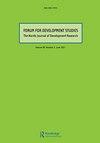危机时期博茨瓦纳的公共收入多元化
IF 1.1
Q3 DEVELOPMENT STUDIES
引用次数: 1
摘要
摘要为了最大限度地提高社会和经济福利,政府需要充足和多样化的收入。由于全球相互关联,公共收入容易受到全球金融危机和全球卫生流行病(如新冠肺炎)等宏观冲击的影响。易受危机和流行病影响,需要实现收入多样化,主要是在博茨瓦纳等单一文化经济体。因此,本文旨在讨论博茨瓦纳在危机时期的收入多元化举措。本文在解释主义的基础上,采用了定性的案例研究方法。由于这是一项桌面研究,它使用了辅助数据源。该文件的结论是,寻求公共收入多样化的努力尚未取得成果,因此,目前还不可能进行评估。尽管有上述结论,博茨瓦纳案例的总体教训是,公共收入多样化势在必行,特别是考虑到2007年后和新冠肺炎的财政紧缩。最后,收入多元化并不是在真空中实现的。因此,必须将其纳入公共财政管理改革。本文章由计算机程序翻译,如有差异,请以英文原文为准。
Public Revenue Diversification in Botswana During Crisis Times
Abstract To maximise social and economic welfare, governments need sufficient and diversified revenues. Due to global interconnectedness, public revenues are susceptible to macro shocks such as global financial crises and global health pandemics (e.g. COVID-19). Susceptibility to crises and pandemics necessitates revenue diversification, mainly, in mono-cultural economies such as Botswana. So, this paper aims to discuss revenue diversification initiatives in Botswana during crisis times. The paper, based on interpretivism, used the qualitative case study approach. Since it is a desktop study, it used secondary data sources. The paper concluded that the quest for public revenue diversification is yet to bear fruit, hence, an evaluation is impossible for now. The foregoing conclusion notwithstanding, the general lesson from the Botswana case is that public revenue diversification is imperative, particularly given post-2007 and COVID-19 fiscal strictures. Finally, revenue diversification does not happen in a vacuum. Therefore, it must be girded in public financial management reforms.
求助全文
通过发布文献求助,成功后即可免费获取论文全文。
去求助
来源期刊

FORUM FOR DEVELOPMENT STUDIES
DEVELOPMENT STUDIES-
CiteScore
1.80
自引率
14.30%
发文量
24
期刊介绍:
Forum for Development Studies was established in 1974, and soon became the leading Norwegian journal for development research. While this position has been consolidated, Forum has gradually become an international journal, with its main constituency in the Nordic countries. The journal is owned by the Norwegian Institute of International Affairs (NUPI) and the Norwegian Association for Development Research. Forum aims to be a platform for development research broadly defined – including the social sciences, economics, history and law. All articles are double-blind peer-reviewed. In order to maintain the journal as a meeting place for different disciplines, we encourage authors to communicate across disciplinary boundaries. Contributions that limit the use of exclusive terminology and frame the questions explored in ways that are accessible to the whole range of the Journal''s readership will be given priority.
 求助内容:
求助内容: 应助结果提醒方式:
应助结果提醒方式:


